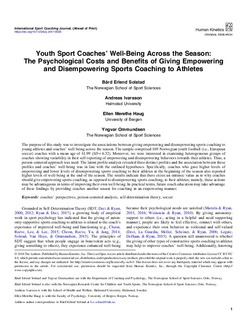| dc.contributor.author | Solstad, Bård Erlend | |
| dc.contributor.author | Ivarsson, Andreas | |
| dc.contributor.author | Haug, Ellen | |
| dc.contributor.author | Ommundsen, Yngvar | |
| dc.date.accessioned | 2018-09-05T08:38:19Z | |
| dc.date.available | 2018-09-05T08:38:19Z | |
| dc.date.created | 2018-04-05T08:03:00Z | |
| dc.date.issued | 2018 | |
| dc.identifier.citation | International Sport Coaching Journal. 2018, 5, 124-135. | nb_NO |
| dc.identifier.issn | 2328-918X | |
| dc.identifier.uri | http://hdl.handle.net/11250/2560849 | |
| dc.description | This is an Open Access article distributed under the terms of the Creative Commons Attribution License CC BY NC 4.0, which permits unrestricted noncommercial use, distribution, and reproduction in any medium, provided the original work is properly cited, the new use includes a link to the license, and any changes are indicated. See http://creativecommons.org/licenses/by-nc/4.0. This license does not cover any third-party material which may appear with permission in the article. For commercial use, permission should be requested from Human Kinetics, Inc., through the Copyright Clearance Center (http://www.copyright.com). | nb_NO |
| dc.description.abstract | The purpose of this study was to investigate the associations between giving empowering and disempowering sports coaching to young athletes and coaches’ well-being across the season. The sample comprised 169 Norwegian youth football (i.e., European soccer) coaches with a mean age of 41.99 (SD = 6.32). Moreover, we were interested in examining heterogeneous groups of coaches showing variability in their self-reporting of empowering and disempowering behaviors towards their athletes. Thus, a person-centered approach was used. The latent profile analysis revealed three distinct profiles and the association between these profiles and coaches’ well-being was in line with the outlined hypotheses. Specifically, coaches who gave higher levels of empowering and lower levels of disempowering sports coaching to their athletes at the beginning of the season also reported higher levels of well-being at the end of the season. The results indicate that there exists an intrinsic value as to why coaches should give empowering sports coaching, as opposed to disempowering sports coaching, to their athletes; namely, these actions may be advantageous in terms of improving their own well-being. In practical terms, future coach education may take advantage of these findings by providing coaches another reason for coaching in an empowering manner. | nb_NO |
| dc.description.abstract | Youth Sport Coaches’ Well-Being Across the Season: The Psychological Costs and Benefits of Giving Empowering and Disempowering Sports Coaching to Athletes | nb_NO |
| dc.language.iso | eng | nb_NO |
| dc.subject | coaches’ perspectives | nb_NO |
| dc.subject | person-centered analysis | nb_NO |
| dc.subject | self-determination theory | nb_NO |
| dc.subject | soccer | nb_NO |
| dc.title | Youth Sport Coaches’ Well-Being Across the Season: The Psychological Costs and Benefits of Giving Empowering and Disempowering Sports Coaching to Athletes | nb_NO |
| dc.title.alternative | Youth Sport Coaches’ Well-Being Across the Season: The Psychological Costs and Benefits of Giving Empowering and Disempowering Sports Coaching to Athletes | nb_NO |
| dc.type | Journal article | nb_NO |
| dc.type | Peer reviewed | nb_NO |
| dc.description.version | publishedVersion | nb_NO |
| dc.rights.holder | © 2018 The Authors | nb_NO |
| dc.source.pagenumber | 12 | nb_NO |
| dc.source.journal | International Sport Coaching Journal | nb_NO |
| dc.identifier.doi | 10.1123/iscj.2017-0026 | |
| dc.identifier.cristin | 1577569 | |
| dc.description.localcode | Seksjon for coaching og psykologi / Deparment of Coaching and Psychology | nb_NO |
| cristin.unitcode | 150,32,0,0 | |
| cristin.unitname | Seksjon for coaching og psykologi | |
| cristin.ispublished | true | |
| cristin.fulltext | original | |
| cristin.qualitycode | 1 | |
